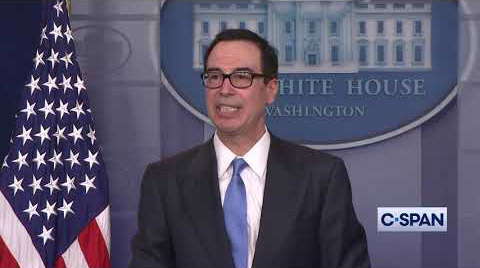by WorldTribune Staff, March 12, 2020
The U.S. Treasury Department is working with the International Monetary Fund (IMF) and the World Bank to ensure that funds from the IMF and World Bank aren’t used to pay off debts which nations have incurred due to China’s Belt and Road infrastructure initiative, Treasury Secretary Steven Mnuchin said on Wednesday.

“We think this is critically important,” Mnuchin told a hearing of the U.S. House of Representatives Appropriations Committee. “We’re not ever going to be using money from these international organizations to pay back China.”
Some countries which are deeply in debt due to Belt and Road Initiative (BRI) projects have turned to the IMF for assistance. Pakistan entered a $6 billion loan program with the Fund in July 2019.
At a news conference in Beijing on Thursday, China’s Foreign Ministry spokesman Geng Shuang responded to questioning about Mnuchin’s comments by saying international financial institutions were not “political tools” and had assessed the Belt and Road initiative positively.
Forbes noted in a January analysis that, nearly seven years since the Belt and Road began, many nations are saddled with “untenable debt. Many major projects are currently strewn around the world in half-finished disrepair and the opportunities that were sold to local populations rarely materialized. All up and down the Belt and Road, projects have been marred by delays, financial implosions and (occasionally violent) outpourings of negative public sentiment.”
Related: Wei Fenghe confirms the obvious: China’s belt and road initiative is power projection, July 16, 2019
“As Chinese companies push deeper into emerging markets, inadequate enforcement and poor business practices are turning the BRI into a global trail of trouble,” wrote Jonathan Hillman of the Center for Strategic and International Studies. “A long list of Chinese companies have been debarred from the World Bank and other multilateral development banks for fraud and corruption, which covers everything from inflating costs to giving bribes.”
The Forbes analysis noted: “There are many other examples of parties from China allegations of corruption up and down the Belt and Road. Bangladesh shut down a highway project that was supposed to have been built by the China Harbour Engineering Company due to the company reputedly offering a Bangladeshi official a bribe; Chinese tech giants Huawei and ZTE have been probed for wrongdoing in numerous BRI countries; and the U.S. arrested the emissary of China’s CEFC Energy Company for illicit payments to officials in Chad and Uganda. A 2017 McKinsey survey found that between 60 to 80 percent of Chinese companies in Africa admitted to paying bribes and, almost needless to say, in the latest Transparency International Bribe Payers Index, Chinese firms scored second to last.”
Intelligence Brief __________ Replace The Media
